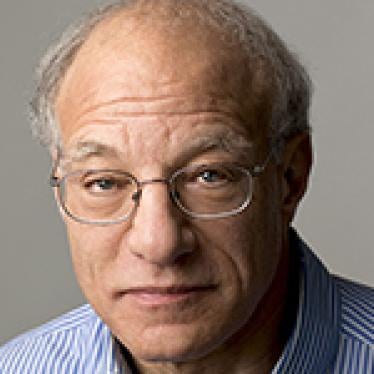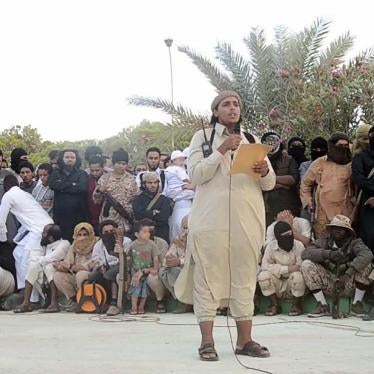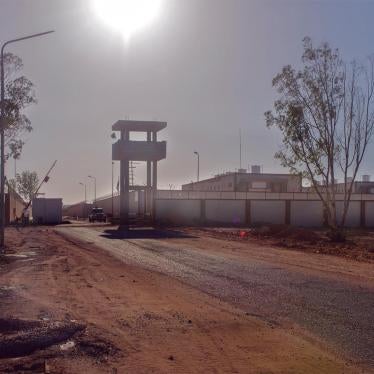When the United Nations Security Council unanimously referred the situation in Libya to the International Criminal Court prosecutor on Feb. 26, it made clear that impunity for crimes against humanity threatens international peace and security. The referral sent a strong message that systematic attacks with deadly force against peaceful protesters have criminal consequences.
Now, the governments that took the lead in the 15-to-0 Security Council vote — Britain, France and the United States — seem to be negotiating a deal that, if it goes through, would short-circuit justice by sidelining the court’s proceedings for victims in Libya.
Britain’s foreign secretary, William Hague, said recently that it was important for Muammar el Qaddafi, the Libyan leader, to relinquish all power, but that after that: “What happens to Qaddafi is ultimately a question for the Libyans.” This turnabout is enough to set even the nimblest diplomatic head spinning.
After setting the wheels of justice in motion, all Security Council members — and these three countries in particular — should be reaffirming the message that impunity is no longer an option, instead of proffering a get out of jail free card to end a military stalemate. Amnesty for mass atrocities, whether explicit or de facto, has no legal validity internationally.
Fortunately, we have moved past the point where governments can offer immunity to people implicated in serious international crimes. Indeed, the Security Council’s unanimous referral of the situation in Libya to the International Criminal Court reflects its choice to hold international criminals accountable, including senior officials.
On June 27, three judges at the I.C.C. issued arrest warrants for Qaddafi, his son Seif al-Islam Qaddafi, and Libya’s intelligence chief, Abdullah Senussi. They are wanted on charges of crimes against humanity for their roles in attacks on civilians, including peaceful demonstrators, in Tripoli, Benghazi, Misurata, and other Libyan cities and towns.
These warrants were an important step toward providing justice for the victims of the serious crimes in Libya.
Now that there is an independent international judicial process in place the process should be allowed to play out. Moreover, the I.C.C. prosecutor should apply the law impartially and investigate alleged crimes by the Libyan rebels as well as any committed by NATO forces. It is simply too late to turn back the clock.
An offer of amnesty to an accused sitting head of state can make the situation a lot worse by sending a signal that there will be no cost for slaughtering as many people as possible in the effort to cling to power. If more brutality works, the leader is home free. If it doesn’t keep him in power, there’s no penalty for having tried. This is an awful message to abusive leaders around the world — if they hang on long enough, tiring out the opposition forces, all will be forgiven.
While Qaddafi cannot be granted a formal amnesty for serious crimes committed in Libya, diplomats may be thinking of using a possible escape hatch contained in the I.C.C.’s treaty. Under Article 16 of the I.C.C. Statute, the Security Council may, citing the needs of international peace and security, defer the proceedings against Qaddafi for 12 months. This truly unfortunate provision authorizes political interference in a judicial proceeding, and it should be used only in exceptional circumstances.
Since a suspension under Article 16 is limited to a renewable 12-month duration, if the Security Council granted a deferral there would be enormous pressure to renew it after a year and then again at the expiration of each succeeding year. This would spawn the ugly optic of Security Council members voting each year for continued immunity for Qaddafi.
Of course, a deferral of an I.C.C. investigation also risks setting a dangerous precedent for accused senior officials from other countries. By effectively bartering away accountability for the most serious crimes under international law, the Council would be encouraging all those alleged to be responsible for major atrocities to negotiate, as Qaddafi is now attempting to do, to void the rule of law. Indeed, a deferral for Qaddafi may lead other accused war criminals such as President Omar Hassan al-Bashir of Sudan to renew his claim to suspend the I.C.C. warrant against him for crimes committed in Darfur.
In addition to renouncing judicial principle and creating a troubling precedent, a plan that gives Qaddafi a comfortable retirement (inside or outside of Libya) is short-sighted. Qaddafi, who holds no official government post and exercises enormous power through his presence, would remain a destabilizing figure, and the Libyan people would probably not feel free from fear and intimidation. Moreover, effectively amnestying the top leaders would also make it difficult, if not impossible, to prosecute anyone else in the regime for crimes committed there over 40 years of Qaddafi’s rule.
In the short-term, it is easy to understand the temptation to forego justice in an effort to end an armed conflict. But instead of putting a conflict to rest, a de-facto amnesty that grants immunity for crimes against humanity may just spur another cycle of grave abuses while failing to bring peace.
Richard Dicker is the international justice director at Human Rights Watch.







